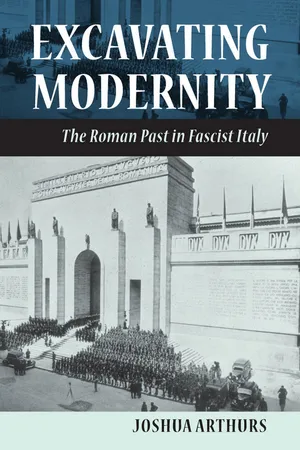
- 232 pages
- English
- ePUB (mobile friendly)
- Available on iOS & Android
About this book
The cultural and material legacies of the Roman Republic and Empire in evidence throughout Rome have made it the "Eternal City." Too often, however, this patrimony has caused Rome to be seen as static and antique, insulated from the transformations of the modern world. In Excavating Modernity, Joshua Arthurs dramatically revises this perception, arguing that as both place and idea, Rome was strongly shaped by a radical vision of modernity imposed by Mussolini's regime between the two world wars.
Italian Fascism's appropriation of the Roman past—the idea of Rome, or romanità— encapsulated the Fascist virtues of discipline, hierarchy, and order; the Fascist "new man" was modeled on the Roman legionary, the epitome of the virile citizen-soldier. This vision of modernity also transcended Italy's borders, with the Roman Empire providing a foundation for Fascism's own vision of Mediterranean domination and a European New Order. At the same time, romanità also served as a vocabulary of anxiety about modernity. Fears of population decline, racial degeneration and revolution were mapped onto the barbarian invasions and the fall of Rome. Offering a critical assessment of romanità and its effects, Arthurs explores the ways in which academics, officials, and ideologues approached Rome not as a site of distant glories but as a blueprint for contemporary life, a source of dynamic values to shape the present and future.
Frequently asked questions
- Essential is ideal for learners and professionals who enjoy exploring a wide range of subjects. Access the Essential Library with 800,000+ trusted titles and best-sellers across business, personal growth, and the humanities. Includes unlimited reading time and Standard Read Aloud voice.
- Complete: Perfect for advanced learners and researchers needing full, unrestricted access. Unlock 1.4M+ books across hundreds of subjects, including academic and specialized titles. The Complete Plan also includes advanced features like Premium Read Aloud and Research Assistant.
Please note we cannot support devices running on iOS 13 and Android 7 or earlier. Learn more about using the app.
Information
Table of contents
- List of Illustrations
- Acknowledgments
- List of Abbreviations
- Introduction
- 1. The Third Rome and Its Discontents, 1848–1922
- 2. Science and Faith: The Istituto di Studi Romani, 1922–1929
- 3. History and Hygiene in Mussolini’s Rome, 1925–1938
- 4. The Totalitarian Museum: The Mostra Augustea della Romanità, 1937–1938
- 5. Empire, Race, and the Decline of Romanità, 1936–1945
- Conclusion
- Notes
- Bibliography